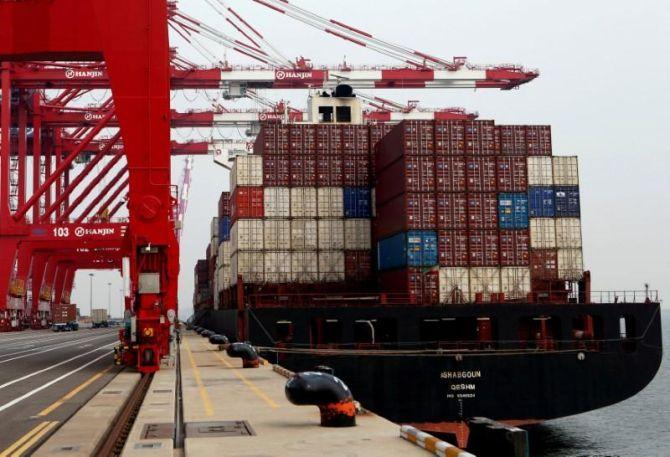Demand will boom in the US and China, but exporters say it will be difficult for India to tap these markets.
Subhayan Chakraborty reports.

Global trade growth is expected to rebound in 2017, but India may not be able to take advantage of this in the US and China -- major markets where consumer and industrial demand is set to drive trade forward.
Recently, the World Trade Organisation raised the estimate for growth in world merchandise trade volume for 2017 to 3.6 per cent from 2.4 per cent it had projected earlier.
The revision is because of positive economic trends in North America and China that are leading to a resurgence of industrial and consumer demand.
However, exporters and trade experts said it would be difficult for India to tap this demand in the near term.
The US is the largest destination for Indian exports, earning $42 billion in 2016-17.
The share of goods heading to the US has increased over the past five years to 15.3 per cent in 2016-17.
However, major export categories such as textiles and gems and jewellery have stagnated in the US market.
India's textile exports to the US, across categories such as apparel, made-ups and accessories, have suffered over the last few years due to cheaper alternatives from Bangladesh, Vietnam and the Philippines.
"Our market share has stagnated in the low single digits and I do not see a change anytime soon, either in the US or in Europe," said S K Jain, chairman of the Apparel Export Promotion Council.
India's exports of gems and jewellery, especially rough or processed diamonds, were $9.7 billion, up 12 per cent in the last year.
But experts said the trend might be reversed next year.
The US is a major market for Indian manufacturers of generic drugs, almost half of which, by volume, reach US shores.
"In the US, almost 80 per cent of generics are sourced from India. However, the market share has stagnated while growth in value terms has slowed down," said P V Appaji, former executive director at Pharmexil.
This was mainly due to price erosion, he added.
On the other hand, India is ill equipped to expand exports to China, its largest trading partner.
Only 3.68 per cent of India's exports find their way to China.
Facing a $51 billion trade deficit with China, India is trying to upgrade its basket of exports to the country.
Cotton, iron ore and copper, the mainstay of Indian exports to China, have come under increasing scrutiny as both the government as well as exporters try to shift towards value-added exports in an attempt to cap the growing trade deficit.
Then commerce and industry minister Nirmala Sitharaman had said export focus should shift away from raw materials.
The commerce ministry has identified industries such as hardware, electronics, pharmaceuticals, textiles and automobile components to realign and boost exports.
With a burgeoning middle class and rising wages, China is expected to relinquish its dominance over labour intensive, low-end manufacturing in the near future. This is an opportunity the Indian industry is hoping to exploit.
Changing consumption patterns have also shaped greater demand for consumer goods in China, where overall demand in the first half of 2017 was driven by growth in industry (up 6.4 per cent) and services (up 7.7 per cent).
"We are trying to harness our strength in labour intensive sectors where India enjoys significant advantage over other developing nations," a commerce ministry official said.
The top five export categories to China are all input products. These are used by China to manufacture goods that it ships abroad, often back to India.
These, along with other raw materials like iron and iron ore, constituted more than 70 per cent of India's exports to China, said Ajay Sahai, director general, Federation of Indian Exports Organisations.
These export categories were subject to volatile global commodity prices and should be swapped for products higher in the value chain, a trade expert based in Delhi said.
Photograph: Kim Hong-Ji/Reuters












 © 2025
© 2025